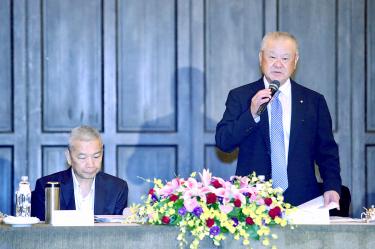The Chinese National Association of Industry and Commerce (工商協進會) yesterday urged the Ministry of Finance to keep corporate income taxes intact, but to axe the levy on retained earnings, saying governments worldwide are easing corporate tax burdens to support the economy and that Taiwan should follow suit.
The Taipei-based trade group made the plea before Minister of Finance Sheu Yu-jer (許虞哲), who was giving a speech on the government’s latest tax reform proposal after being invited by the group.
“The proposal to raise corporate income taxes from 17 to 20 percent is unfavorable for private investment and runs counter to global efforts to stimulate economic growth,” association chairman Lin Por-fong (林伯豐) said.
The US has offered Hon Hai Precision Industry Co (鴻海精密) a US$3 billion tax break and other regulatory waivers for its US$10 billion investment in Wisconsin in support of US President Donald Trump’s policy to revive the US manufacturing industry.
Formosa Plastics Group (台塑集團), the nation’s largest industrial conglomerate, has voiced plans to step up investment in the US by a similar amount, while state-owned refiner CPC Corp, Taiwan (台灣中油) is mulling an investment in shale gas extraction and a petrochemical plant in the US to take advantage of advanced technology there to produce better quality ethylene at lower costs.
Therefore, policymakers should think twice about increasing the tax burden on companies, as they already have to cope with a deteriorating business environment, such as a tight supply of electricity, water, land, labor and talent, Lin said.
Sheu said he would go ahead with the tax reform proposal if he is reappointed by premier-designate William Lai (賴清德).
The minister is to quit with other Cabinet officials today after Premier Lin Chuan’s (林全) resignation on Monday.
“I have not yet been asked to stay, although the media say I would retain my position,” Sheu told reporters.
Sheu on Friday last week introduced a broad tax reform that would cut the tax burden for all by raising tax deduction thresholds and lowering the ceiling on personal income taxes from 45 to 40 percent. The package halves the 10 percent tax on retained corporate earnings.
The trade group has called taxes on retained earnings a punitive levy, as they comes in addition to business income taxes and weaken companies’ ability to invest or expand.
Industrial leaders also complain about the longstanding income tax gap between local and foreign investors, saying such conditions are rare in other nations.
“Most governments grant citizens favored status, but Taiwan does the opposite,” Lin Por-fong said, adding that foreign investors need to pay a flat 20 percent tax on dividend income, but the rates for local investors range from 5 to 45 percent.
The ministry has proposed a hike of the tax rate on foreign investors to 21 percent, while lowering tax rates for domestic investors in a bid to narrow the gap and avoid triggering capital outflows.
Sheu said the ministry would heed opinions from all sectors before turning the tax reform bill over to the legislature later this week.




